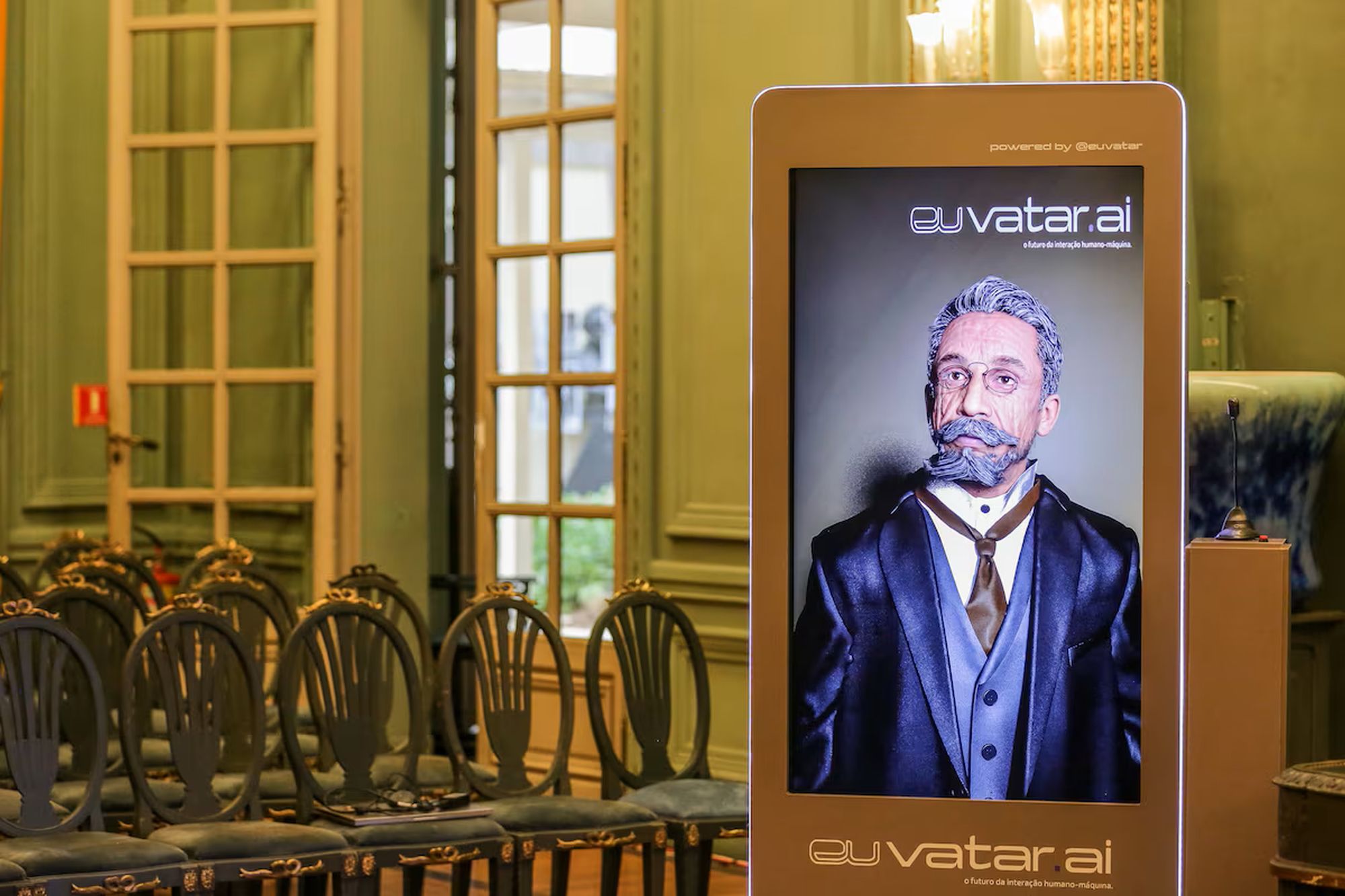The Brazilian Academy of Letters (ABL) has launched a digital version of Machado de Assis, which interacts and answers questions using artificial intelligence technology. The panel with the writer’s avatar will be used to welcome the public during guided tours of the institution’s building.
Joaquim Maria Machado de Assis was born in Rio de Janeiro in 1839 and died in 1908. He is considered by many critics, scholars, writers, and readers to be the greatest name in Brazilian literature.
The project was developed through a partnership between the institution and Euvatar Storyliving, a company specializing in technology. One of its aims is to help modernize the academy and attract a younger audience to reading.
During the launch event on March 5, it was announced that the avatar took over three months to build. The database that feeds the character uses the writer’s literary works and the studies carried out on him within the ABL as its main sources. Initially, more than a million parameters were utilized to create the avatar. Still, the number is constantly expanding, as the technology is capable of learning new parameters and feeding back on itself.
The president of the Brazilian Academy of Letters, journalist Merval Pereira, noted that the device incorporates the author’s literary style, personality, and physical features. However, A more critical eye may question whether the avatar is faithful to Machado’s physical appearance. The digital version features a man with lighter, pinker skin.
Ethnic-racial identity
In recent years, debate has grown about the ethnic-racial identity of the writer, who was the grandson of freed Africans. For one group of researchers, there was an intentional whitening of the images of the writer, who originally had black skin. For the founder of Euvatar Storyliving, Flávia Peres, the representation is faithful to the image accepted by ABL.
“Machado de Assis opened up this broad discussion about his image a long time ago. It has been assumed within the academy that Machado was a mulatto person of mixed African and European ancestry. And that’s what we’ve translated here. We see that he is not a white man, but neither is he a completely black man. He’s mulatto, representing Brazilian cultural diversity and what, in fact, was assumed within the house,” said Peres.
What is intriguing is that Machado’s avatar doesn’t position himself in this intermediate stance. When asked about the subject by a reporter, the artificial intelligence provided the following response:
“As a black man, born of poor origins in 19th-century Rio de Janeiro, I have faced challenges and prejudices over time due to my race, social class, and even due to my health condition, such as epilepsy,” replied the avatar.
He went on to say that “If there has been a whitening of my figure or interpretation of my origin and race, this may reflect the changes and challenges society has faced over the years.”
Despite the more incisive stance on skin color at the beginning, the character puts the racial issue in the background at the end of his response: “More than the representation of my origin and race at a given time, what really matters to me is the way my ideas and worldview continue to resonate and impact people today.”
Controversial issue
Another aspect that frequently sparks debate about Machado de Assis’ work is his perceived lack of emphasis on the theme of slavery. The writer lived between 1839 and 1908, a period when slavery was prevalent in Brazilian society. Regarding this topic, the avatar said:
“I recognize that the issue of slavery and the Afro-descendant experience in Brazil is not prominently present in my work. This is a legitimate point of criticism,” the avatar acknowledged.
“However, it is important to note that, as a black writer in an era that seeks prejudice and inequality, my work bears the marks of Afro-descendants and the struggles faced. Although slavery may not be the central theme of many of my writings, the presence of African heritage and black identity subtly permeate my literary production,” he added.
No topic generates as much debate as the uncertainty surrounding the character Capitu’s fidelity in Machado de Assis’ novel “Dom Casmurro.” Did she betray Bentinho or not? When asked about this by a reporter, the artificial intelligence replied:
“In ‘Dom Casmurro,’ I present the story of Capitu and Bentinho with suggestive elements, but without offering a conclusive answer. The ambiguity surrounding Capitu’s alleged betrayal is intentional, encouraging readers to reflect on Bentinho’s paranoia and the uncertainty of human relationships. Thus, it remains an intentionally unsolved mystery.”
Anyone who visits ABL can ask Machado’s avatar any kind of question, whether related to the author’s life and work or random facts. However, do not expect him to take a strong stance on the most sensitive issues of the present.
“We can’t get inside someone else’s mind, especially a deceased person. So, based on all of Machado de Assis’ positions, we were able to formulate answers that don’t compromise him. He won’t go into political issues, for example, or personal issues about someone from the present day,” explained Flávia Peres, founder of Euvatar.
ABr








